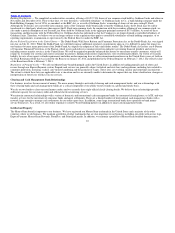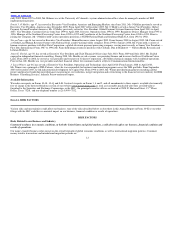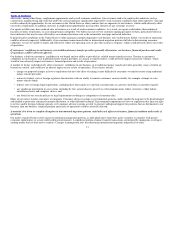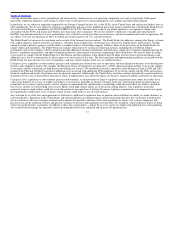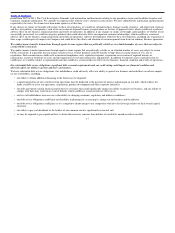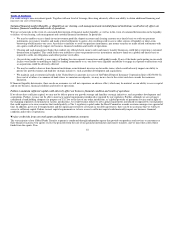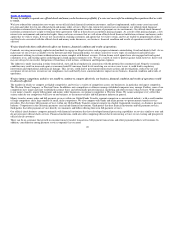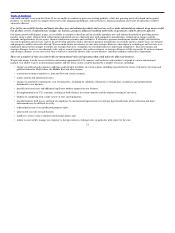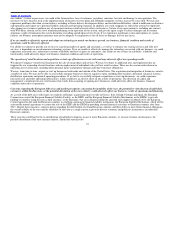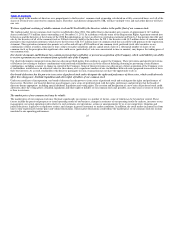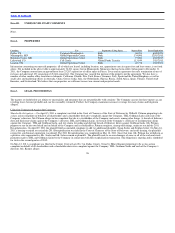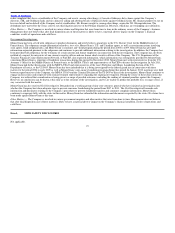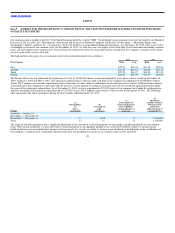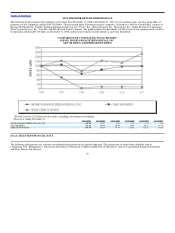MoneyGram 2011 Annual Report Download - page 21
Download and view the complete annual report
Please find page 21 of the 2011 MoneyGram annual report below. You can navigate through the pages in the report by either clicking on the pages listed below, or by using the keyword search tool below to find specific information within the annual report.
Table of Contents
We may be unable to operate our official check and money order businesses profitably if we are not successful in retaining those partners that we wish
to retain.
We have reduced the commission rate we pay to our official check financial institution customers, and have implemented, and in some cases increased,
per−item and other fees for our official check and money order services. Due to the current low interest rate environment, our official check financial
institution customers have been receiving low or no commission payments from the issuance of payment service instruments. Our official check financial
institution customers have a right to terminate their agreements with us if they do not accept these pricing changes. As a result of the pricing changes, a low
interest rate environment and contractual rights, there can be no assurance that we will retain official check financial institution customers and money order
agents that we wish to retain. If we are not successful in retaining customers and agents that we wish to retain, and we are unable to proportionally reduce
our fixed costs associated with the official check and money order businesses, our business, financial condition and results of operations could be adversely
affected.
We face fraud risks that could adversely affect our business, financial condition and results of operations.
Criminals are using increasingly sophisticated methods to engage in illegal activities such as paper instrument counterfeiting, fraud and identity theft. As we
make more of our services available over the Internet and other unmanned media, we subject ourselves to new types of consumer fraud risk because
requirements relating to customer authentication are more complex with Internet services. Certain former retail agents have also engaged in fraud against
consumers or us, and existing agents could engage in fraud against consumers or us. We use a variety of tools to protect against fraud; however, these tools
may not always be successful. Allegations of fraud may result in fines, settlements and litigation expenses.
The industry is under increasing scrutiny from federal, state and local regulators in connection with the potential for consumer fraud. Negative economic
conditions may result in increased agent or consumer fraud. If consumer fraud levels involving our services were to rise, it could lead to regulatory
intervention and reputational and financial damage. This, in turn, could lead to government enforcement actions and investigations, reduce the use and
acceptance of our services or increase our compliance costs and thereby have a material adverse impact on our business, financial condition and results of
operations.
We face intense competition, and if we are unable to continue to compete effectively, our business, financial condition and results of operations would
be adversely affected.
The markets in which we compete are highly competitive, and we face a variety of competitors across our businesses, in particular our largest competitor,
The Western Union Company, or Western Union. In addition, new competitors or alliances among established companies may emerge. Further, some of our
competitors have larger and more established customer bases and substantially greater financial, marketing and other resources than we have. With respect
to our money transfer, urgent bill payment and money order businesses, our primary competitor is Western Union. We cannot anticipate every effect that
actions taken by our competitors will have on our business, or the money transfer and bill payment industry in general.
Money transfer, money order and bill payment services within our Global Funds Transfer segment compete in a concentrated industry, with a small number
of large competitors and a large number of small, niche competitors. We also compete with banks and niche person−to−person money transfer service
providers. The electronic bill payment services within our Global Funds Transfer segment compete in a highly fragmented consumer−to−business payment
industry. Competitors in the electronic payments area include financial institutions, third parties that host financial institution and bill payment services,
third parties that offer payment services directly to consumers and billers offering their own bill payment services.
Our official check business competes primarily with financial institutions that have developed internal processing capabilities or services similar to ours and
do not outsource official check services. Financial institutions could also offer competing official check outsourcing services to our existing and prospective
official check customers.
There can be no assurance that growth in consumer money transfer transactions, bill payment transactions and other payment products will continue. In
addition, consolidation among payment service companies has occurred
20


